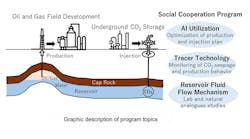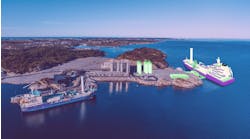Who are the natural owners of maturing offshore assets in the UK North Sea? It has become an increasingly pertinent question, and one that is central to helping to create a sustainable, long-term future for the province.
One of the characteristics of a maturing basin is that the challenges get bigger while the prizes become smaller. The last barrel of oil is the hardest to produce. It therefore takes a huge amount of focus, energy, commitment, vision, and technical expertise to successfully manage maturing assets.
The largest operators certainly possess those qualities but it can be difficult for late-life assets to compete for these companies' resources with many other opportunities elsewhere on the agenda. A vicious circle can develop as neglect of the facilities increasingly diminishes prospects of attracting the fresh investment that they need.
When considering "natural" ownership, materiality is the key. If an asset is material to the owner it will receive maximum attention, creating a virtuous circle of investment and prolonged production life.
Thistle, northeast of the Shetland Islands, is a textbook case of the virtuous circle in action. The field was first developed in the 1970s, but by 2009 was struggling to produce 2,000 b/d. The turnaround program that followed under new ownership paid huge dividends. By last summer, it was recording the highest production levels since the 1990s.
If EnQuest had done nothing with Thistle after acquiring it in 2010 -- when the infrastructure was aging to the point where production may have stopped -- it would potentially have been abandoned by now. It is a similar story for some of the company's other assets in the region such as Heather and the Dons fields.
Reinstating the platform rig allowed EnQuest to drill the field's first new wells in 20 years. Furthermore, a series of modifications and upgrades as part of the company's Late Life Extension project will secure the future of the Thistle platform to 2025 and beyond.
The UK government's brownfield tax allowance, one of a series of new measures designed to stimulate North Sea investment, has helped the company to execute this program, in the process realizing reserves of 35 MMboe. The goals include simplifying and streamlining the Thistle process to create a safe and reliable production environment. The project calls for a major power upgrade featuring the installation of a 30-MW power generation turbine, a new process control safety system, and topsides integrity work to ensure the platform's long-term future.
There are tremendous opportunities in theNorth Sea but the assets must be in the hands of the right companies with the capability and the determination to invest time, effort, and money to make the most of these prospects.
As Sir Ian Wood, who recently led a major independent review of theUK North Sea oil and gas industry, pointed out, UK production could increase substantially over the coming years if major changes are made to how the oil and gas sector operates. If these changes are not made, he warned, Britain could fail to recover even a fraction of the remaining oil and miss out on a £200-billion ($333-billion) injection to the economy.
EnQuest's approach to maximizing oil recovery from mature assets was underpinned by a recent report byOil & Gas UK's production efficiency taskforce. The report showed that during 2010-2012, the company's operations exceeded the taskforce's ambitious target of 80% production efficiency and that last year, it had moved into the top quartile of production efficiency performance of all companies on the UK continental shelf.
The North Sea will continue to witness a strategic trend of maturing assets moving from the global major operators to independents. This process is also evident in more mature provinces such as onshore US, where more and more assets are in the hands of smaller companies.
This shift is a natural progression - to use a wildlife analogy, a lion may make the kill and eat its fill, but there is still a viable meal there for others. It is essential, however, that current owners do not run maturing assets into the ground before moving them on. The industry has to have a regulatory framework that protects assets and helps them move into the hands of companies that are committed to investing in maximizing recovery.
John Cowie
Area Manager-Northern North Sea
EnQuest
This page reflects viewpoints on the political, economic, cultural, technological, and environmental issues that shape the future of the petroleum industry. Offshore Magazine invites you to share your thoughts. Email your Beyond the Horizon manuscript to David Paganie at[email protected].


